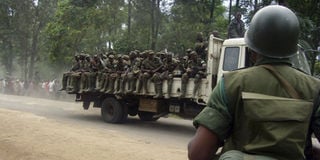DR Congo announces 'state of siege' in two provinces

A Congolese soldier looks at a truck carrying Rwandan soldiers through the town of Rutshuru in Congo's violence-ravaged North Kivu province January 24, 2009.
The Democratic Republic of Congo announced a "state of siege" late Friday in two provinces in the east of the country wracked by violence from armed groups and civilian massacres.
"Taking into account the gravity of the situation... the president informed the cabinet of his decision to proclaim a state of siege in the provinces of North Kivu and Ituri," said Patrick Muyaya.
He said details of what the measure would entail would be released publicly in the next few hours.
Under DRC's constitution, the president can declare either a state of emergency or a state of siege "if severe circumstances immediately threaten the independence or integrity of the national territory, or if they interrupt the regular functioning of institutions".
On Thursday, President Felix Tshisekedi said he was preparing "radical measures" to deal with the security situation in the east of the country.
That followed the prime minister suggesting on Monday that a state of emergency might be declared in the east, "replacing the civil administration with a military administration".
An estimated 122 armed groups of varying sizes operate in mineral-rich eastern DRC, many a legacy of regional wars in the 1990s.
In Paris on Tuesday, Tshisekedi asked France for help "eradicating" one of them, the Allied Democratic Forces, from the Beni region in North Kivu.
The ADF militia are Ugandan Islamist fighters who have made their base in eastern DRC since 1995.
Branded a jihadist organisation by Tshisekedi and the United States, the ADF has killed more than 1,200 civilians in the Beni area alone since 2017, according to a monitor called the Kivu Security Tracker (KST).
The army has conducted operations against them in the region since October 2019, but has not been able to put a stop to the massacres of civilians.
On Friday, police and soldiers in Beni used teargas and whips to disperse high-school students protesting that failure.
Several dozen students had been camping outside the town hall over the past week, demanding the departure of the UN peacekeeping force MONUSCO and for Tshisekedi to visit the troubled region.





